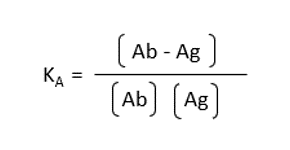Antigen-antibody junctions are specific, non-covalent and reversible interactions, mediated by hydrogen bonds, Van der Waals forces, and hydrophobic and electrostatic interactions. Both affinity and avidity are two fundamental parameters when describing the strength of these unions.
In this entry we collect the 3 main differences between affinity and avidity of the antibodies .
The main difference between antibody affinity and avidity is described by the very definition of these parameters: while Affinity is the measure of the strength of an individual interaction between a specific epitope and an antibody binding site, Avidity is the measure of the total binding between the epitopes of the antigen and the binding sites of the multivalent antibody.
From here, these are the 3 main differences between affinity and avidity of the antibodies:
1.- WHAT INTERACTIONS DO THEY MEASURE?
Affinity
It measures the interaction between an individual epitope of the antigen and an individual binding site of the antibody.
Avidity
It measures the interaction between all epitopes of an antigen and all the binding sites of a multivalent antibody.
2.- WHAT DO THEY DEPEND ON?
Affinity
The affinity constant is defined according to the same basic thermodynamic principles that govern any reversible biomolecular interaction:

Avidity
Avidity depends on three main factors:
- The affinity of the antibody for the antigen epitope
- The valence of the antigen and the antibody
- The structural arrangement of the interaction
3.- WHAT REFLECTS ITS VALUE?
Affinity
Affinity reflects the net result of the forces of attraction and repulsion between an individual epitope of an antigen and its corresponding binding site on the antibody. A high affinity value will be the result of a strong interaction with more attractive forces between the epitope and the binding site.
Avidity
Avidity reflects the sum of all the affinities of an antigen-antibody complex. Its value will always be greater than the sum of the individual affinity values.

